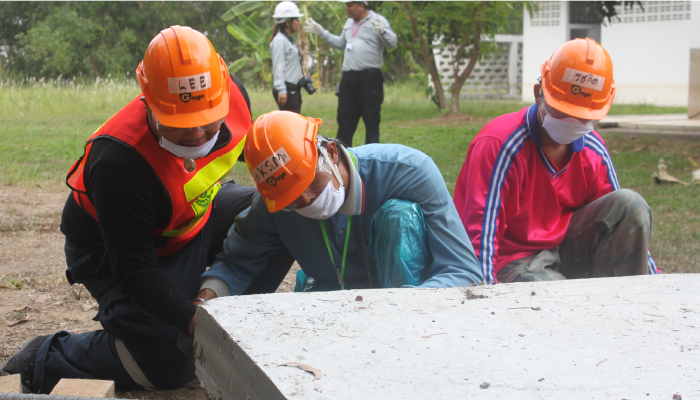Disasters, regardless of natural or man-made, can often pose health threats leading to loss of life, disability and mental illness. A lack of preparation leads to more severe hazards, vulnerability and an inability to deal with health threats.
The Public Health Emergencies (PHE) department at ADPC aims to strengthen national, institutional, and local capacity in health emergencies through disaster planning as well as emergency response and recovery, build relationships between multi-sectoral sectors, and improve overall risk management. Our work aims to equip health emergency managers with skills essential to overcome the challenge of hazard prevention and mitigation, and emergency preparedness.
Enhancing disaster resilience in managing public health emergencies
Our aim to build capacities of humanitarian actors in managing public health emergencies in the field covers a wide spectrum. ADPC collaborates with the Center for Crisis Psychology (CCP) Norway in establishing and strengthening community resilience and safety through capacity building program of the communities and health personnel at various levels on mental health and psychosocial support.
The Mental Health and Psychosocial Support (MHPSS) in Emergencies Training Program launched in 2010 with BRAC Bangladesh aimed to establish a system for enhancing the capacity of the community on Psychological First Aid to be able to manage victims immediately post-disaster; to strengthen the knowledge, attitude, and skills of health workers in managing children disaster victims; and to enhance the capacity of mental health professionals to manage identified mentally pathologic cases during disaster.
Building capacities in health risksand emergency management
Together with our institutional partners and extensive network of specialists, we offer wide range of training and capacity building activities that include:
Inter-regional and National Public Health Emergency Management in Asia and the Pacific: Regarded by World Health Organization (WHO) as the original flagship course for health emergency management learning, the PHEMAP program focuses on improving capacity in management and coordination among health emergency managers in disaster-prone countries in the region.
Public Health in Complex Emergencies: The PHCE program aims to build capacity of health managers to deal with health-related issues in humanitarian crises or conflict conditions. Working with refugees and internally displaced populations is, for example, one of the challenges facing health professionals in complex emergencies.
Hospital Emergency Preparedness and Response: The HEPR course helps to develop the knowledge and skills of health care personnel to prepare their facilities to respond effectively, to ensure continuous operations during or even after disasters, and to recover for better from the impacts of disasters.
Nutrition in Emergencies: The course will enable health emergency managers to better aware of nutritional needs among population affected by the disasters. Health emergency managers will be equipped with competencies needed to support nutritional responses in emergencies.
Mental Health and Psychosocial Support: The MHPSS training program aims to strengthen community safety and resilience through capacity development of health personnel at various levels to manage psychosocial impacts of disasters.
Epidemic and Pandemic Preparedness: Geared towards strengthening capacities of countries in Asia to anticipate, prepare for, and manage the risks of zoonotic diseases in emergencies and share knowledge and experiences in the management of epidemic and pandemic diseases by human health, animal health and other sectors.
Establishing sustainable emergency response at hospitals and communities
Earthquakes, floods, droughts, cyclones and disease outbreaks could overwhelm emergency response at hospitals and communities without effective systems put in place.
The Program for Enhancement of Emergency Response (PEER) is a regional program initiated in 1998 with the support from the United States Agency for International Development Office’s U.S. Foreign Disaster Assistance (USAID/OFDA). PEER aims to boost local and regional disaster preparedness and build the response capacities of vulnerable countries within Asia region through two objectives:
Hospital Preparedness for Emergencies (HOPE): The five-day training program focuses on health care personnel. HOPE aims to building capacities essential for effective rapid response to emergencies involving large numbers of casualties.
Community Action for Disaster Response (CADRE): The basic training aims to enable local residents to become “first responders” to the unexpected incidents relating health emergencies through technical and practical exercises. CADRE participants from national and community levels will be equipped with skills essential for health emergency management.




